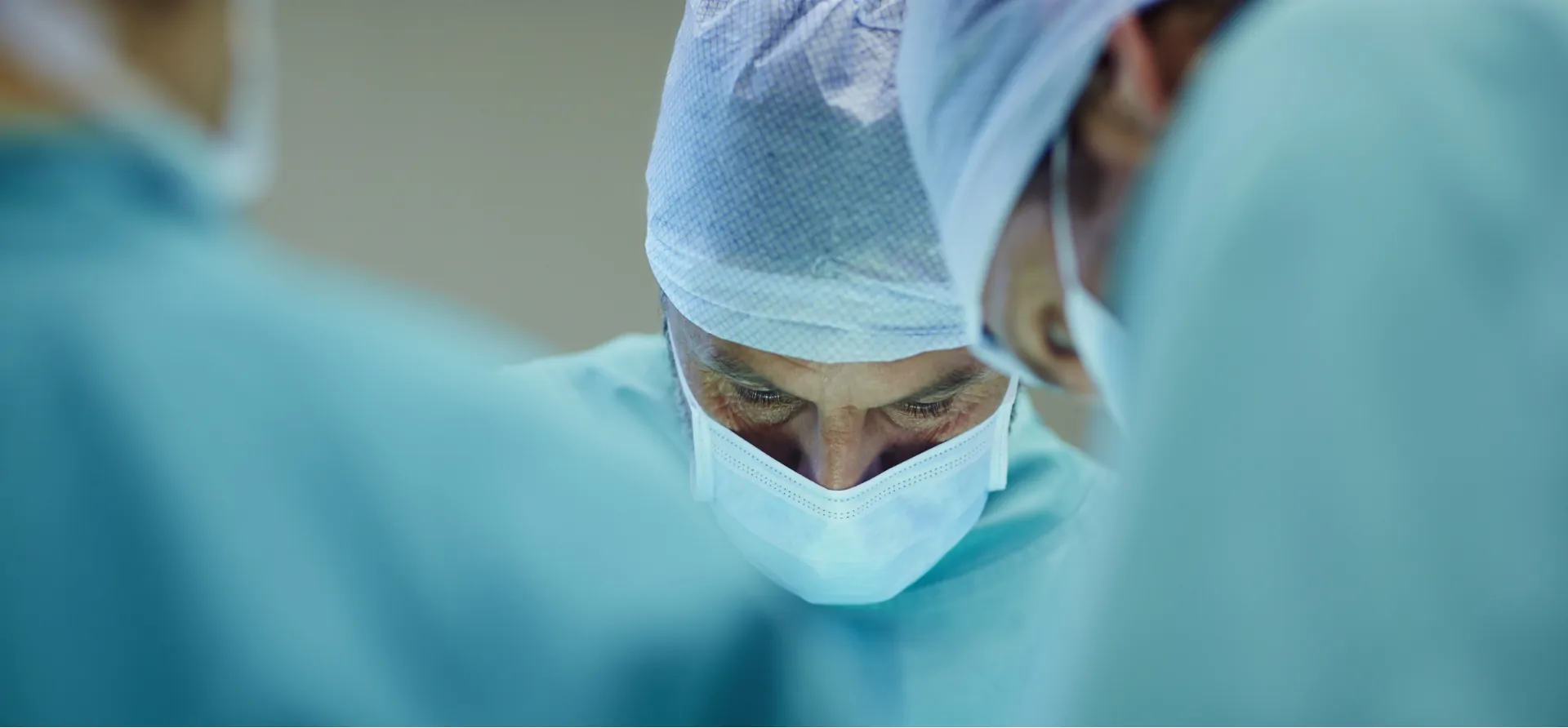
Medical Negligence
Surgical Claims
Surgical mistakes happen when something goes wrong before, during or after an operation. The consequences can be devastating but you may be able to make a medical negligence claim.
What are surgical mistakes?
A surgical mistake happens when something goes wrong during an operation. Common surgical mistake claims include:
- Using faulty or unsuitable medical equipment
- Disability or death caused by damaging supporting biological structures, organs, or blood vessels during surgery
- Delays in operating or providing surgical intervention
- Cosmetic surgery errors
- Anaesthetic errors
Mistakes can also be made before or after surgery, these can include:
- Failing to identify the correct patient (in an outpatient setting)
- Failing to advise a patient of the risks and issues with consent
- Failing to perform pre-surgical assessments and scans (such as obtaining correct medical history, checking patient medication, blood tests, screening and heart monitoring)
- Failure by theatre staff to check equipment before and after surgery
- Failing to identify and treat infections acquired during surgery
- Incorrect post-surgical medication
Further information
What are surgical ‘Never Events’?
Surgical ‘Never Events’ are serious and preventable patient safety incidents that should never occur if healthcare providers have implemented existing national guidance or safety recommendations appropriately. According to NHS England, surgical Never Events are becoming more and more common, but this is maybe due to the NHS putting systems in place to report incidences, which have led to increased numbers of reported Never Events, rather than mistakes being more commonplace.
Examples of surgical Never Events include:
- Wrong site surgery
- Retained foreign object post procedure
- Wrong implant/prosthesis
Wrong site surgery
As an example of the number of incidents, back between 1 April and 31 August 2022, there were 73 reported wrong site surgery Never Events in England and Wales. These included:
- Wrong surgery of the eyes, including laser treatment
- Wrong surgery on the cervix instead of the rectum
- Both tonsils removed instead of one
- Botulinum toxin injection to wrong site
- Gastroscopy instead of colonoscopy
- Gastroscopy intended for another patient
- Incisions to wrong body parts
- Injections to wrong body parts
- Intrauterine contraceptive device intended for another patient
- Injections intended for other patients
- Lesion removed from wrong breast
- Procedures intended for another patient, including a lumbar puncture intended for another patient
- Removal of both ovaries when the surgical plan was to remove one of them
- Removal of ovaries when the surgical plan was to conserve them
- Skin biopsy intended for another patient
- Wrong side injections/insertions
Retained foreign object post-procedure
Also between 1 April and 31 August 2022, there were 43 reported retained foreign objects post-surgical procedure Never Events in England and Wales. Objects that were retained included:
- Breast prosthesis sizer
- Guidewire – abdominal drain
- Guidewire – central line
- Guidewire – chest drain
- Laparoscopic specimen bag
- Part of a drill bit not identified as missing during the procedure
- Part of a guidewire not identified as missing at the time of the procedure
- Part of instrumentation not identified as missing at the time of the procedure
- Surgical swab
- Suture anchor tips not identified as missing at the time of the procedure
- Vaginal swab
Case studies of retained foreign objects post-procedure:
- A patient needed suturing after an episiotomy during a vaginal delivery. To create a clear view for the suturing procedure, three swabs were placed in the patient’s vagina, to be removed as soon as suturing was complete. Only two swabs were removed. This error was realised when the swab fell out a few days after the patient and her baby went home.
- A patient undergoing eye surgery as a day case had a pledget inserted under her eyelid at the beginning of the procedure. The pledget should have been removed at the end of the surgery but was not. The patient telephoned for advice the day after her procedure because her eye was painful. When she returned to the unit to be examined, the pledget was found and removed
- A patient had an interventional cardiology procedure using a guidewire. No problems with the procedure were noticed at the time, but an x-ray taken for another reason several days later revealed a broken-off guidewire tip lodged in a blood vessel.
Wrong implant/prosthesis
Between 1 April and 31 August 2022, there were 17 reported wrong implant/prosthesis Never Events in England and Wales. These incidents involved:
- Aortic graft
- Hip
- Intrauterine contraceptive device
- Knee
- Lens
- Wrong gastrojejunal tube
- Wrong sacral nerve stimulation device
- Wrong side plate
Case study:
- A patient attended hospital for a procedure on their eye. The surgeon – a senior trainee – discussed the risks and benefits of right cataract surgery and the target refractive outcome with the patient, who consented to the procedure with the aim of achieving an emmetropic (no distance glasses) outcome. The team did not identify that the lens power did not match that selected on the biometry and IOL selection sheet, and previously stated at the sign-in. The senior trainee continued with surgery supervised by the consultant, and the wrong lens was implanted in error.
Surgical negligence and how to bring a claim
Negligence
The recovery post-surgery can be a difficult time, made even more difficult if there has been a surgical mistake, as this can lead to longer recovery time and further complications. If you’ve suffered a surgical mistake, you may also need help with rehabilitation, assistance, and additional care that you otherwise wouldn’t have needed.
Standards of surgery in the UK are generally high, but surgical mistakes do happen and are statistically increasing due to pressure on resources and an increase in the total number of surgical procedures. But not all mistakes amount to negligent treatment – where a doctor’s care has fallen below a reasonable standard, you may be able to bring a surgical negligence claim, and be entitled to compensation.
If someone dies as a result of a surgical mistake, who can bring a claim?
If someone has died as result of a surgical mistake, and they have a Will in place, the executor of that Will can bring a claim on behalf of the estate. The executor can apply for probate, which allows them to administer the estate on behalf of the deceased, and to bring legal proceedings on their behalf.
Limitations to making a claim
You normally have three years to make a claim from the date of the negligent treatment, or from the date you realised your condition was a result of your treatment. If you were under the age of 18 when you received the treatment, you will have three years from your eighteenth birthday to make a claim.











